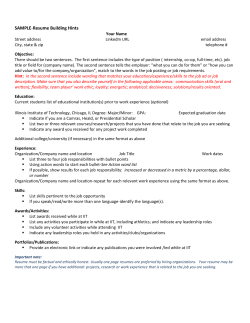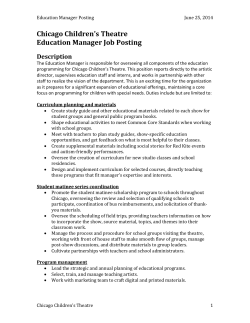
Document 245272
WHY CQ IS SPECIAL AND A GOOD CHOICE FOR YOUR CHILD. I’m writing this article for the school as a clinical psychologist but also as a parent. It has come to my attention that there are some misgivings and misunderstanding regarding what the school is trying to do, so I’m glad to offer my professional opinion about the school and its curriculum. I teach intellectual and cognitive assessment at a couple of the professional psychology schools in Chicago. I also run clinics and supervise training of doctoral students where we test people for psychopathology, learning disorders and cognitive impairment. Including my pre-‐doctoral work in mental health, I have over 30 year experience in the field and can say, with utter confidence, two important things about academic and professional success. First, intellectual ability is complex and debatable. Second, intellectual ability is predicated on emotional health. In other words, intelligence involves a wide range of capacities, many that are hard to measure and whatever a person’s innate capacity may be, he or she will find success if they are happy at what they do. As Steve Job’s advised in his famous commencement speech at Stanford University in 2005, “love what you do.” Early in my training as a clinical psychologist at the University of Chicago, I worked in the psychiatry department with parents and infants, 0-‐3 year olds. I was struck by the fact that the human, baseline mental state, does not involve rich emotion. Our baseline, our mind in neutral, is simply “interest“. Interest is a neutral state that involves openness to the environment, a preparedness to take in information. We either gravitate toward pleasurable stimuli or avoid or attack stimuli that are toxic. However, our baseline is merely intellectually receptive; it is a natural state that defines all children. For example, we all struggle to walk, talk and manipulate our environment in the process of becoming self-‐sufficient. Taking on challenge is at the root of our basic mental condition. So, if kids don’t learn, then something must get in the way of learning. Kids who are not learning are thwarted in their natural propensity to take in information. What might make learning aversive in school? What fuels a significant dropout rate of kids in Chicago and leads to the nearly 15% of 19-‐24 year olds with no high school diploma. This is an important question for our society at large, and one I believe CQ is attempting to answer. Science offers decades of research on what does work. People learn and succeed when “interest” leads to enjoyment and then to passion. Everyone is motivated to walk because they get tired of crawling around, some even become Olympic athletes. Positive emotions and having fun are crucial to learning. Negative mental states impede learning. In my courses, we spend considerable time discussing the relevance that psychopathology has on a person's ability to access their cognitive resources. That is, if people are too emotionally unbalanced, they will have a difficult time using their brains. In my experience, depression or anxiety can easily drop an IQ by 10 points. Once a troubled child receives support and treatment, his or her academic function is bound to improve. Success in school really does have to do with interest, motivation and emotional stability. I am not surprised by the plethora of articles in the recent press criticizing and challenging the value of higher education. It turns out that no less than eight Nobel Prize winners did not finish high school and over 25 billionaires dropped out of college. Bill Gates, Steve Jobs and Mr. Zuckerman (the guy who started Facebook) are probably some of the best known college dropouts. In each case, success clearly was not predicated on a grade or what school they graduated from. They didn’t. Psychological research shows that “success” involves a particular mindset. Carol Dweck of Stanford University argues that success is promoted by a “growth mindset”, versus a “fixed mindset.” A growth mindset is distinctive of people who are ultimately successful. People with a “fixed mindset”limit their progress and tend to stick with what they already know. Dweck points to Thomas Edison, Michael Jordan, and Mohammad Ali as individuals who were not particularly talented to start with but through persistence, hard work and determination were able to become ultimately successful, really successful. A person with a growth mindset tends to view failure as a challenge to overcome and not as a reflection of their personal worth. This research is in line with Malcolm Gladwell’s argument in “Outliers”. He suggests that Bill Gates and the Beatles were successful primarily due to passion and the opportunity for hard work and pursuit of their interests. Success was not primarily due to their innate talents but their drive to follow what they loved. How does Chicago Quest focus on what is essential for learning and success? CQ is a spinoff from a school in New York City called “Quest to Learn”. It was started by Professor Katie Salen and others. Katie Salen is a professor of education but also happens to be a computer programmer and game designer. The curriculum of this charter school is based on cutting-‐edge science in education and utilizes digital technology and game theory to teach children. Part of the thinking behind this curriculum is to tap into children’s natural interests and motivation. Children are motivated to master a video game or win a board game and the school attempts to capitalize on this natural propensity. Teachers organize their classroom curriculum around successions of goals and challenges that encourage children to work collaboratively to solve problems. Yes, they try to make learning fun. In addition to building a curriculum around games and having fun, they take away the external motivations of grades and focus on internal motivation, the desire to learn itself, the innate wish to solve problems. The school does provide feedback on each child’s progress. In fact, they provide more detail regarding progress in reading, writing and arithmetic than schools utilizing traditional grading systems. CQ tries to focus on innate ability, interest and motivation to learn. When children graduate from high school, they will translate their progress and accomplishments, with an algorithm, into grades for purposes of applying to college. However, the children will have spent their time in the classroom learning and not focused on external measurements of success. Chicago quest is so cutting edge in terms of the science of education that they were awarded a MacArthur grant. These are the guys that provide millions of dollars for "geniuses" to free up their time to just “do their thing”. I think they've have a good track record and I’ve personally met at least a couple recipients of their fellowship and would describe them as super smart and creative. Wow, I have my son in a school backed by the MacArthur Foundation, the kind of school I would've loved to go to when I was growing up. Honestly, through elementary school and high school, I could count on one hand the number of teachers that I found inspiring. I write this as a son whose parents were both educators and all their friends were teachers. I had respect for education. However, something about the system led me to focus on my intellectual interests during my free time, while struggling in the classroom. With this said, it never ceases to surprise me that Chicago Quest struggles in its own right. Parents have taken their children out of the school. There is concern that without grades, “how are these kids going to get into a good college.” I've heard concern that the children are “playing too much” and that they can't possibly be learning if they are having too much fun. I think these misunderstandings are pervasive in our culture. Sometimes, as a society, we resist innovation and are vulnerable to our own "fixed mindset“. In conclusion, CQ is really at the forefront of education. However, many of their strategies are not as new as you might think. I went to graduate school with a colleague who had gone to college at Hampshire College, down the road from where I grew up. Hampshire has been around for decades and has never had grades. My colleague completed a PhD in a department noted for being one of the harder places to obtain a doctorate at the University of Chicago. The University had accepted her as someone who was bright and innovative, without grades. CQ is providing an innovative education and adding training in digital technology, preparing kids to become facile with the tools necessary for success in the modern world. They may even be ahead of their peers from other schools. And, wont it be great when these kids leave high school for college, or some other equally valuable experience, and people welcome them saying, “oh, you went to that innovative, unique school in Chicago. You must have something to offer.” ************************************************************** David Paul Smith, Ph.D. Chief Psychologist and Director of Training St. Bernard Hospital suite 212, Bock Professional Pavilion 326 West 64th Street Chicago, Illinois 60621 President and CEO Integrative Psyche Services, S.C. Office:773-962-4016 Fax: 773-483-0411 Mobile: 773-562-3276 Hyde Park Office: 1525 East 53rd St. Suite 935, Chicago, Illinois 60615 Office of Behavioral Health, St. James Hospital Olympia Fields and Chicago Heights, Illinois main Number: 708-7474000 Ingalls Memorial Hospital One Ingalls Drive; Harvey, IL 60426 Phone: 708.333.2300 Adjunct Faculty: Adler School of Professional Psychology & Chicago School of Professional Psychology Student Member Liaison and Scholarship Committee Chair: Society for Clinical and Experimental Hypnosis Member of Society of Psychotherapy Research **************************************************************
© Copyright 2025





















